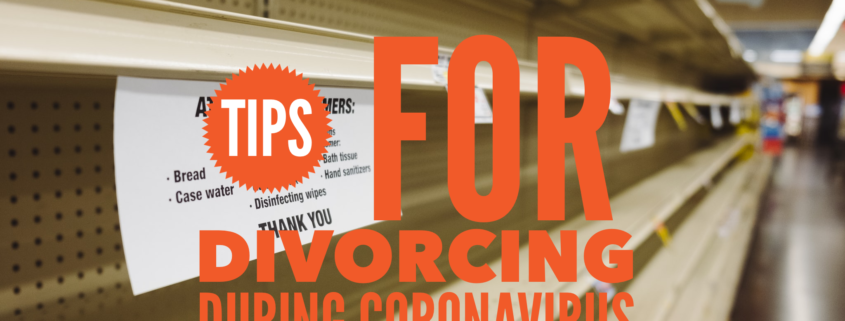Tips for Divorcing During Coronavirus
These are not normal times, and coronavirus is changing every aspect of life from working, to shopping, to interacting with family. Divorce is not immune to these changes, and the way you approach divorce must, by necessity, be different.
Here are tips on divorcing during coronavirus.
Take a Breath
Divorce is difficult enough in the best of times. During coronavirus, you are likely facing two traumas at once: the end of a relationship with someone you thought you would be with forever, and the upending of your life and inability to go out and be with friends who would otherwise console you. You or your spouse may begin doing things or saying things that seem completely out of character.
Take a breath. A deep breath. Try to center yourself. This is especially important if you have children who are looking to you to be their rock. They, too, are probably frightened, and need you to be stable for them when there is much instability around them.
And even if you do not have children, it is important that you make wise decisions now. After all, these decisions will likely affect the rest of your life. And you may find that these decisions may be easier if you just stop and take a deep breath first.
Prepare for “Virtual” Meetings
Most clients hire me after they come into my office for a one-hour meeting. Rightly so, they want to get to know me; after all, I will be working with them and helping them make life-changing decisions. Many feel that this can best be done by meeting face-to-face.
In the time of coronavirus, in-person meetings are probably going to be on hold for awhile. And yet, we can still meet face-to-face. Our office can set up a videoconference where you meet with a lawyer using only your smartphone or a webcam. If you do not have a smartphone or webcam, we can always set a time to talk over the phone.
So, for the time being, you should prepare yourself that many of your meetings will be “virtual” rather than in person.
Learn About Online Dispute Resolution Options
Even during normal times, I strongly suggest that families stay away from the courthouse. Fighting in public courts is a miserable way to resolve disputes, not to mention a very expensive way. Now, there are also health reasons to stay away from courts. In fact, many judges are canceling their hearings, clogging up the judicial backlog even further.
Now, more then ever, families are better off finding alternative methods to resolve their disputes. Online dispute resolution allows for that even for spouses who are unable to leave their home.
Online Collaborative Divorce allows you and your spouse to have separate, individual attorneys to provide each of you with independent counsel. The key to Online Collaborative Divorce is that the lawyers are prohibited from fighting in court. This means that Collaborative Lawyers spend no time, energy, or money on opposition research, dirty trial tactics, or endless motion practice. The spouses and Collaborative Lawyers (and any other professional whom the family needs) get together in virtual meetings (via videoconference software or, if video is unavailable, via telephone). Collaborative Lawyers guide the spouses to amicably make decisions that are in the family’s long-term future.
Another option that families have is Online Mediation. Like in-person Mediation, spouses use a neutral and impartial Mediator to facilitate an agreement. Like Online Collaborative Divorce, the Mediator and spouses (and lawyers, if the spouses have lawyers) meet using videoconference software or teleconferencing means.
Conclusion on Divorcing During Coronavirus
Times are stressful, but you will get through this. If you feel overwhelmed, take a deep breath. Schedule a time to virtually meet with a professional who can help you out. And learn your options for Online Dispute Resolution.
Adam B. Cordover is a leading Collaborative Divorce Lawyer and Florida Supreme Court Certified Family Law Mediator. Adam is on the Board of the International Academy of Collaborative Professionals and Florida Academy of Collaborative Professionals. Adam is co-editor of an American Bar Association book on alternative dispute resolution.






